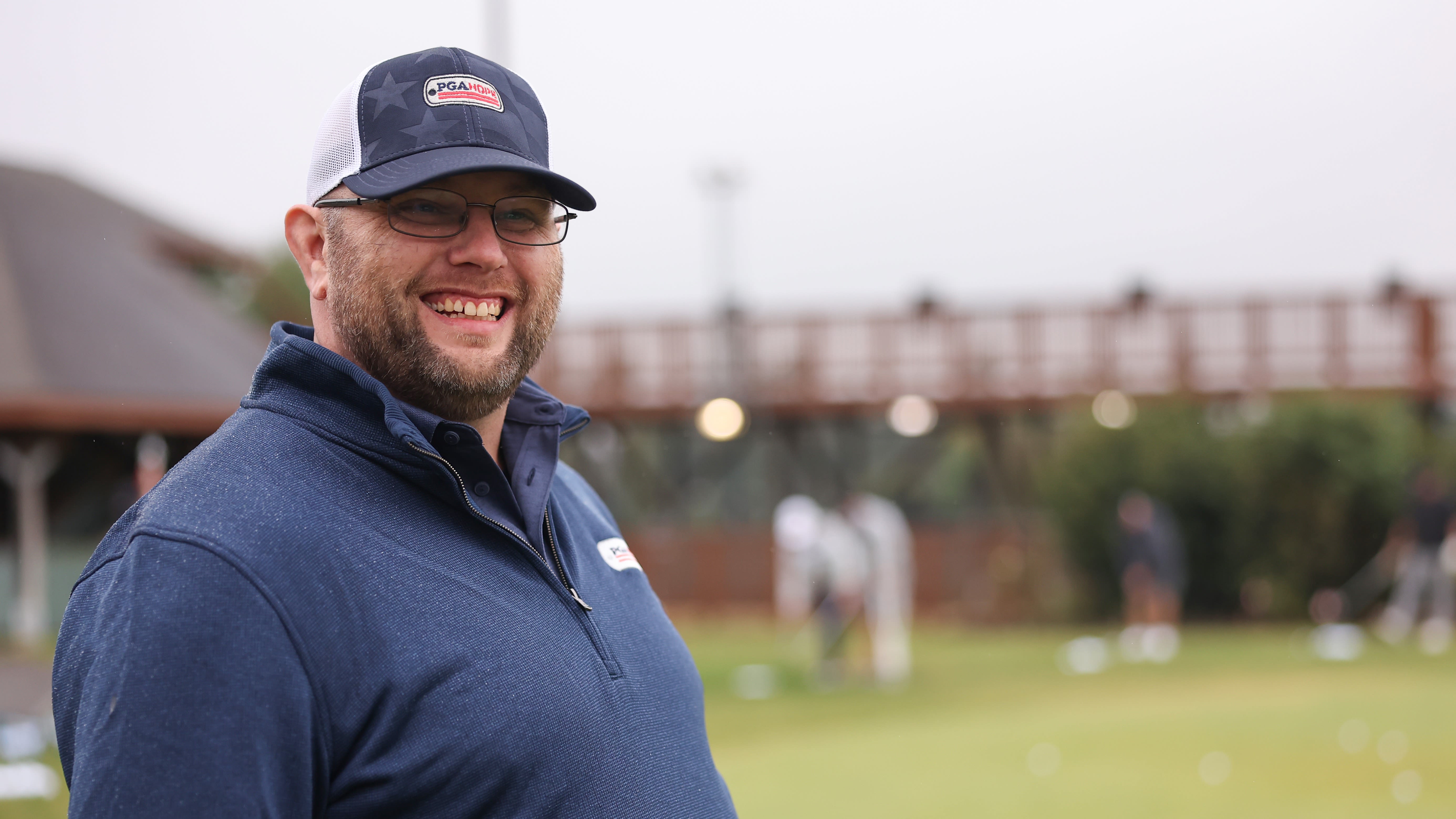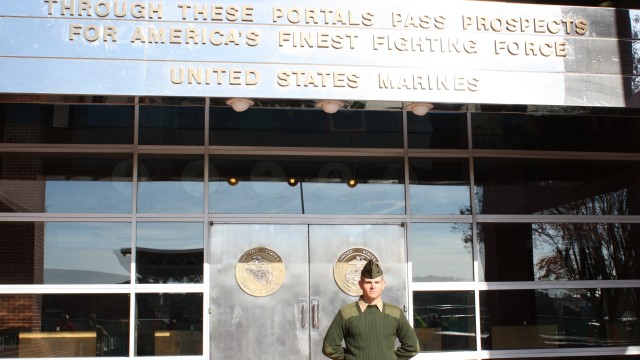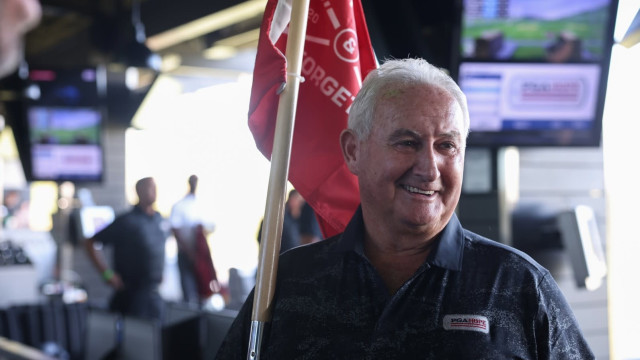Game Changers
The Story of Veteran Michael Slater and the Hope of a Better Tomorrow
By Jay Coffin
Published on

There are few settings in the game as spectacular as the clubhouse patio at Congressional Country Club on a brisk fall afternoon. The leaves are changing colors. The sun is setting over the perfectly manicured fairways. And the massive American flag is flapping proudly in the breeze.
Retired U.S. Army Staff Sgt. Michael Slater found himself there in October, representing the Connecticut PGA Section as one of 20 Veterans selected to participate in PGA HOPE National Golf and Wellness Week in Washington, D.C.
“It’s one of the most beautiful places I’ve ever been in my life,” Slater said. “Everyone is so excited. And I am, too. Trust me, I’m honored to be there. But there’s also so much guilt for me.”
A few days after that moment on the patio marked the 14-year anniversary of the death of Slater’s good friend, Army Staff Sgt. Bradley Espinoza, who was killed Oct. 19, 2009, when he was hit by an improvised explosive device (IED) while leading a route-clearing package in Q-West, Iraq. He was just 26.
Slater, now 41, served with the 1st Cavalry Division out of Fort Hood and was on his third deployment to the Middle East, working on community engagement issues and attempting to improve the quality of life for Iraqis before transitioning back into route-clearance duty on the second platoon. A soldier was removed from the first platoon, so the acting platoon sergeant tapped Slater to run the platoon for a stretch and, eventually, transition into a squad leader position. But Slater declined, reasoning that his original team was just beginning to hit its stride and he wanted to remain in his current position.
The platoon sergeant asked Slater for a recommendation on who should fill the role.
He immediately nominated Espinoza.
“There’s your guy,” Slater told him. “He’ll do great.”
Two months later, Espinoza was killed.
“That’s the stick for me,” Slater said. “I wasn’t the only part of this decision, all these other people had a part in it, but to me, that doesn’t matter. You never say no in the military – somebody tells you to do something, you do it. The one time in my career I get the option to say no, this is the outcome.
“How do I get to have joy and embrace these things in life when I still feel to this day like I failed him?”
* * *
A day later, Slater was prepping for an interview in the Congressional clubhouse when he walked through the ballroom where there was a rehearsal for the banquet dinner later that evening. A clip happened to be showing from the movie “The Outpost,” where 50 U.S. soldiers battled more than 300 insurgents at the Battle of Kamdesh.
Slater immediately went into what he calls a full-blown panic attack.
“The trigger was instantaneous, and I had no control,” he said. Slater’s team leader Mike Jaborek helped get him outside where Slater sat in an Adirondack chair, took off his shoes and ran his feet through the grass, eventually regaining control five minutes later.
“For someone who spends their whole life maintaining control in the worst situations, to have every ounce of control ripped away from you is terrifying,” he said. “Once you start spinning, it just gets faster and faster.”
Slater grew up with an older sister and younger brother in a low-income house in Holyoke, Massachusetts, with what he says were absentee parents. Football was the only sport that he loved, but he knew long before high school graduation that college was not for him. He wanted a ticket out of Western Mass, so he joined the Army.
In 2001, Slater was scrubbing pots and pans at Fort Leonard Wood in Missouri when the 9/11 terrorist attacks happened. Shortly after he was recruited to return to Massachusetts at the Soldiers Systems Center in Natick for 90 days. The goal was to stay there longer, but he was ordered to head to Fort Hood in Texas, which felt like “the other end of the world” to a native New Englander.
Slater and his high-school sweetheart Renee got married at the Justice of the Peace in Vermont, then the couple hopped on a train to Texas to begin their new life. The entire eight years stationed in Texas were spent with Slater either deployed to the Middle East or preparing to be deployed. He was sent into battle twice for 12 months and once for 14 months during that span, with son Thomas being born in 2008, just three weeks before he left on his final combat tour.
The first deployment to Bagdad took a toll. Slater and his fellow soldiers never felt safe. Anytime he was outside, even on the Army base, he wore full body armor. A military command officer was struck and killed by a mortar while walking to the showers. Still, Slater volunteered with one of the line platoons patrolling the streets in the evening.
“If it’s dangerous inside, why would I not want to be outside?” he said. “I needed the change.”
After a year at home with Renee in Fort Hood, Slater went back, this time to the Diyala River Valley in Baqubah. It was another tough deployment; the job was to continue to push out the insurgency. It started by doing assessments and attempting to build relationships with the locals and transitioned into clearing routes.
In December of 2006, just two months into the deployment, Slater was a gunner in a Humvee when he and four others were hit with an IED. His convoy was in front, and there was supposed to be a small gap before the second convoy followed. But the second convoy didn’t create a close enough gap, making it appear like Slater’s group was alone and leaving them vulnerable. Slater lost consciousness, but neither he nor anyone with him were severely injured.
Slater never told his wife that he was hit with an IED. It wasn’t until nearly two years later, when the Slaters were out with friends, that a buddy mentioned what happened. It was the first time that a furious Renee learned about her husband’s harrowing experience.
“You just try to protect the people who are most important to you,” Slater said. “I didn’t want to add to her stress. It wouldn’t have changed anything. I wasn’t coming home.”
The next deployment to the Middle East was the one when Espinoza was killed on that fateful day 14 years ago. After returning to Texas, the Slaters moved to Germany in 2010 and Renee gave birth to daughter Michaela soon thereafter. Michael was part of a new company this time, the 42nd Clearance Company, and it was his job to prepare basic trainees to head to Afghanistan in two years, where he went with them in his final deployment.
* * *
That’s where PGA HOPE enters the picture.
PGA HOPE (Helping Our Patriots Everywhere) introduces golf to Veterans and Active Duty Military to enhance their physical, mental, social and emotional well-being. Slater had dabbled with the game during his early military days, but it was more of a release than anything he was trying to master. He bought a cheap set of clubs in Texas but gave them away to a friend when he moved to Germany a decade ago.
After medically retiring in 2015, Slater was floundering. He enjoyed staying home with his young children for five years, but he needed more of a purpose. He had volunteered for various Veterans services initiatives in South Hadley, Massachusetts, when a full-time job opened for a Veteran Services Officer position two years ago. He got the gig.
“I get to change lives every day,” he said. “I get to help them pay their rent, buy food, take care of their medical care. It’s pretty awesome.”
A group of Veterans told Slater that he needed to join the PGA HOPE program. After some nudging, he attended Dennis Dungee’s program at Springfield Country Club and immediately was hooked.
“I obviously get to know each of the Veterans who have gone through our program and have befriended some of them afterward,” said Dungee, the PGA HOPE lead for the Connecticut PGA Section. “He was just one that I gravitated to. Good personality, outgoing. He’s just a guy’s guy. He’s easy to get along with. I enjoy spending the time with him and love his appreciation for what we’re doing.”
Which is why Dungee nominated Slater for the Ambassador honor. Dungee was in Washington, D.C. last month and kept tabs on Slater when he learned of his panic attack, which originally kept Slater from attending the banquet dinner. But Dungee, Jaborek and Chris Nowak, PGA HOPE’s Military and Veteran Liason, had eyes on Slater and let him know that they would find a way to get him to the gathering if he changed his mind. After some meditation and breathing exercises, Slater jumped in the shower and joined the festivities.
“It was the highlight of my week, seeing him show up that night,” Nowak said. “I’m a big fan of his.
“If that came up and he was in a program that wasn’t based on dealing with mental health and mental wellness, then who knows how that day could’ve turned out for him.”
Added Slater: “PGA HOPE has me until I die. There’s nothing I wouldn’t do for this organization. They were there to support me with no questions asked. I’ve never had that before.”
After a few weeks home, Slater has had more time to reflect. He’s determined to help grow the PGA HOPE program. He was honored to represent his Section. And he learned that there are so many people who care about him, even though there may be dark times where that doesn’t seem like the case.
“I think I’m in a good spot,” Slater said. “Even when something happens to me like what happened at Congressional, there’s a reason it happened. Sometimes things need an outlet. I hope every time it does happen, I get a little smarter about not letting it continue to build until it explodes.


